Unit 4: Professional Practice and Development in Education Report
VerifiedAdded on 2023/06/08
|24
|9043
|430
Report
AI Summary
This report analyzes professional practice and development within the field of education and training. It begins by defining the essential skills and attributes of a good teacher, including communication, patience, and critical evaluation. The report then explores the concepts of professionalism and dual professionalism, emphasizing the importance of ethical values and professional conduct in the classroom. It further examines how social, political, and economic factors influence educational policies, particularly within the UK context. The report delves into the roles of stakeholders and external bodies, analyzing their impact on curriculum design, delivery, and assessment. It also assesses quality improvement and assurance arrangements, including self-assessment, self-evaluation, and the quality cycle within an educational organization, offering suggestions for program enhancements. The report provides a thorough overview of the key aspects of educational practice, policy, and stakeholder relations.
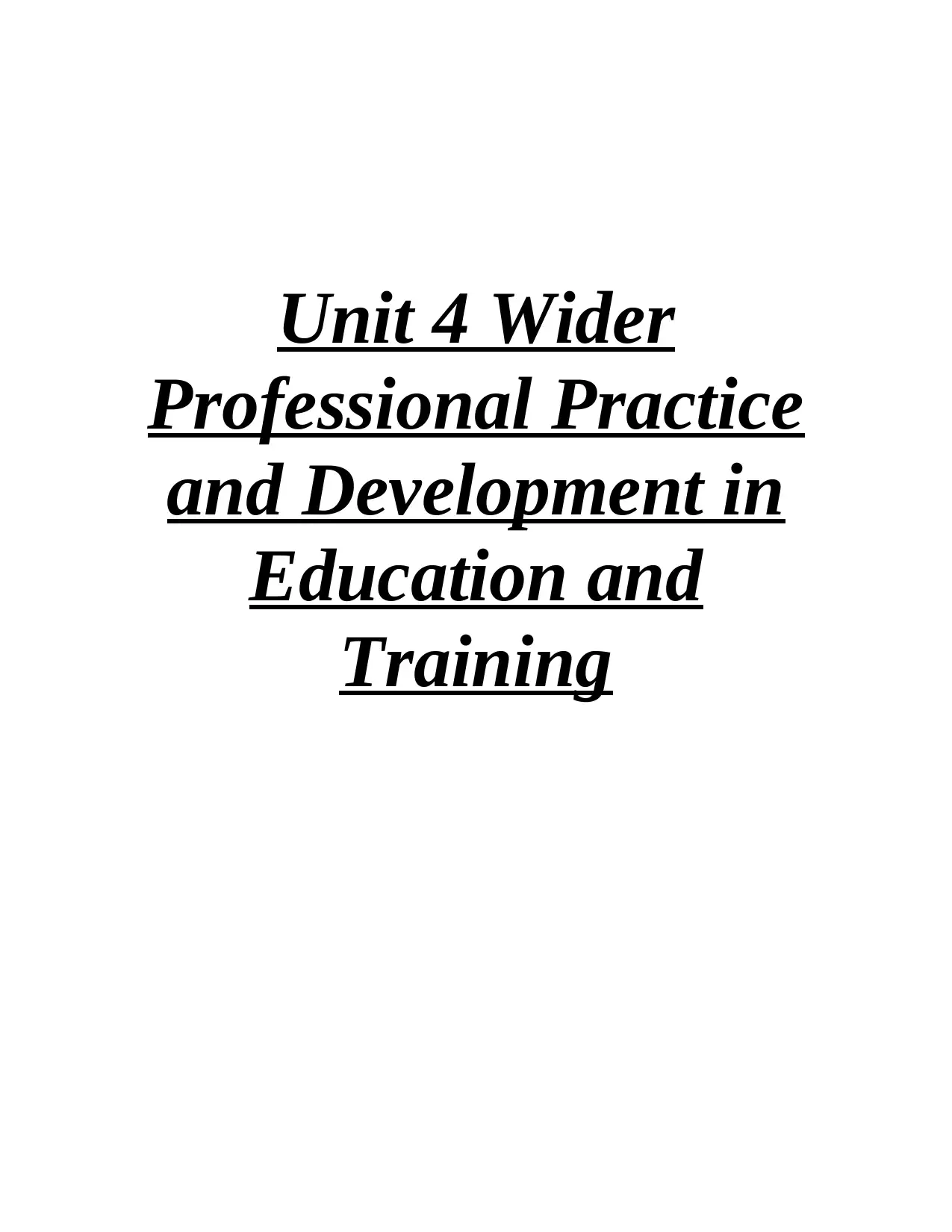
Unit 4 Wider
Professional Practice
and Development in
Education and
Training
Professional Practice
and Development in
Education and
Training
Paraphrase This Document
Need a fresh take? Get an instant paraphrase of this document with our AI Paraphraser
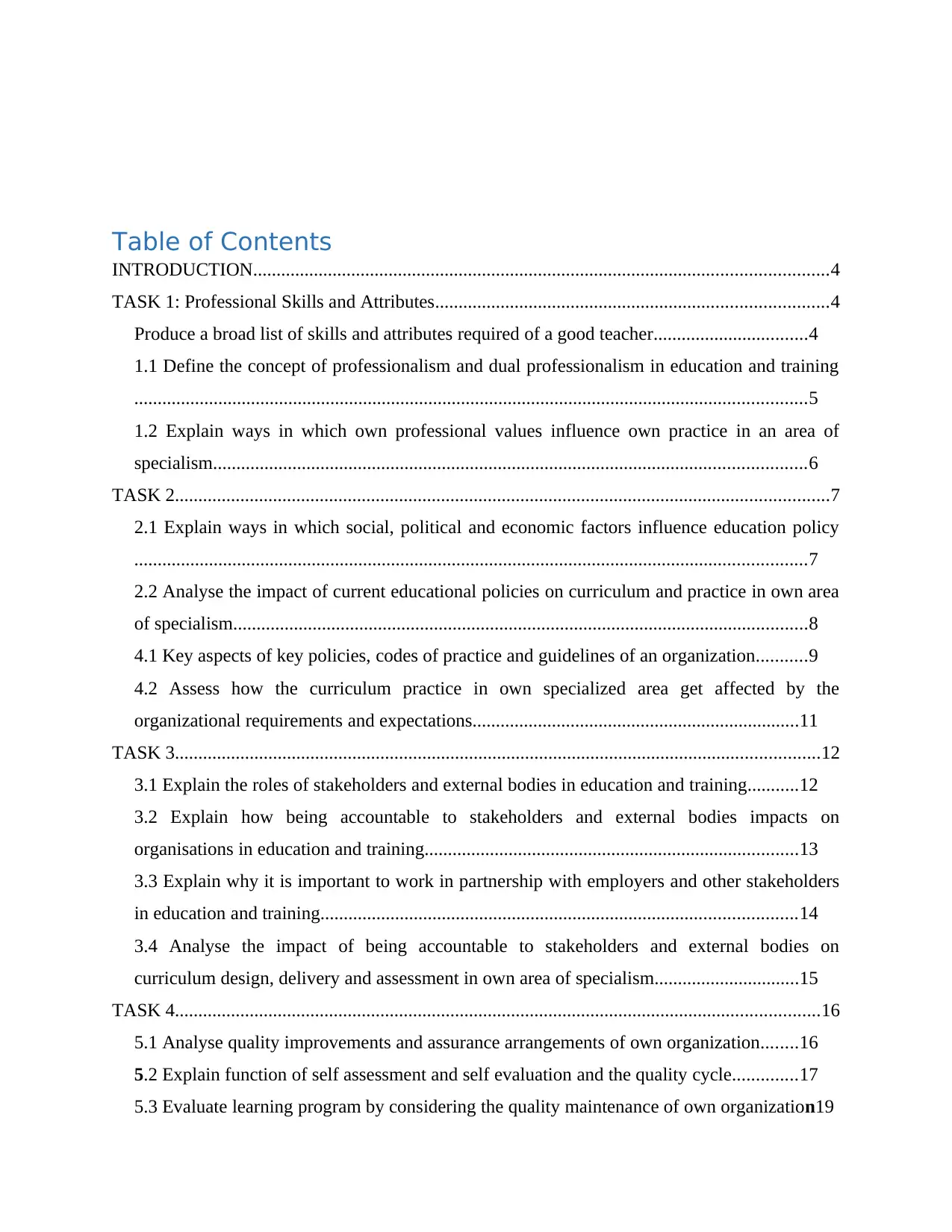
Table of Contents
INTRODUCTION...........................................................................................................................4
TASK 1: Professional Skills and Attributes....................................................................................4
Produce a broad list of skills and attributes required of a good teacher.................................4
1.1 Define the concept of professionalism and dual professionalism in education and training
................................................................................................................................................5
1.2 Explain ways in which own professional values influence own practice in an area of
specialism...............................................................................................................................6
TASK 2............................................................................................................................................7
2.1 Explain ways in which social, political and economic factors influence education policy
................................................................................................................................................7
2.2 Analyse the impact of current educational policies on curriculum and practice in own area
of specialism...........................................................................................................................8
4.1 Key aspects of key policies, codes of practice and guidelines of an organization...........9
4.2 Assess how the curriculum practice in own specialized area get affected by the
organizational requirements and expectations......................................................................11
TASK 3..........................................................................................................................................12
3.1 Explain the roles of stakeholders and external bodies in education and training...........12
3.2 Explain how being accountable to stakeholders and external bodies impacts on
organisations in education and training................................................................................13
3.3 Explain why it is important to work in partnership with employers and other stakeholders
in education and training......................................................................................................14
3.4 Analyse the impact of being accountable to stakeholders and external bodies on
curriculum design, delivery and assessment in own area of specialism...............................15
TASK 4..........................................................................................................................................16
5.1 Analyse quality improvements and assurance arrangements of own organization........16
5.2 Explain function of self assessment and self evaluation and the quality cycle..............17
5.3 Evaluate learning program by considering the quality maintenance of own organization19
INTRODUCTION...........................................................................................................................4
TASK 1: Professional Skills and Attributes....................................................................................4
Produce a broad list of skills and attributes required of a good teacher.................................4
1.1 Define the concept of professionalism and dual professionalism in education and training
................................................................................................................................................5
1.2 Explain ways in which own professional values influence own practice in an area of
specialism...............................................................................................................................6
TASK 2............................................................................................................................................7
2.1 Explain ways in which social, political and economic factors influence education policy
................................................................................................................................................7
2.2 Analyse the impact of current educational policies on curriculum and practice in own area
of specialism...........................................................................................................................8
4.1 Key aspects of key policies, codes of practice and guidelines of an organization...........9
4.2 Assess how the curriculum practice in own specialized area get affected by the
organizational requirements and expectations......................................................................11
TASK 3..........................................................................................................................................12
3.1 Explain the roles of stakeholders and external bodies in education and training...........12
3.2 Explain how being accountable to stakeholders and external bodies impacts on
organisations in education and training................................................................................13
3.3 Explain why it is important to work in partnership with employers and other stakeholders
in education and training......................................................................................................14
3.4 Analyse the impact of being accountable to stakeholders and external bodies on
curriculum design, delivery and assessment in own area of specialism...............................15
TASK 4..........................................................................................................................................16
5.1 Analyse quality improvements and assurance arrangements of own organization........16
5.2 Explain function of self assessment and self evaluation and the quality cycle..............17
5.3 Evaluate learning program by considering the quality maintenance of own organization19
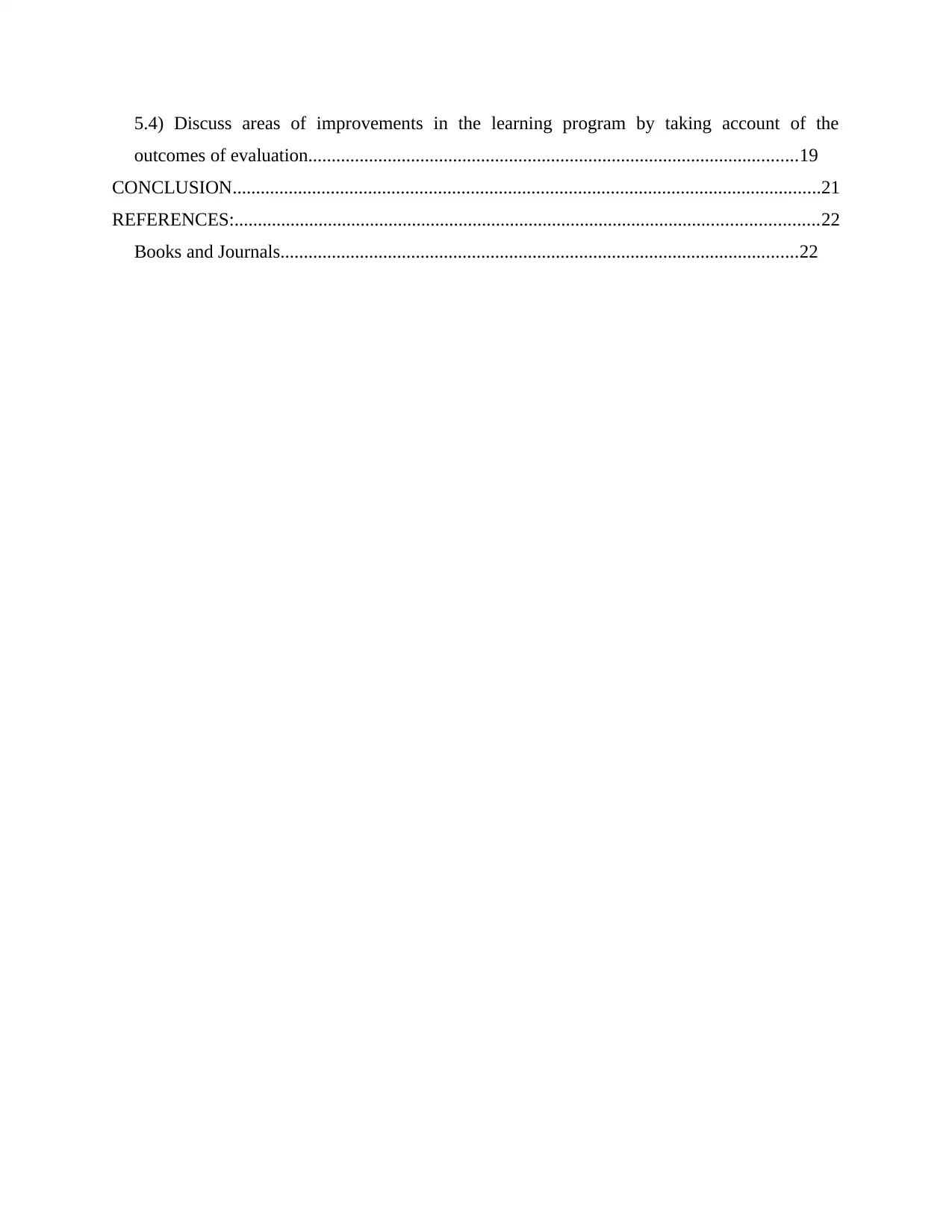
5.4) Discuss areas of improvements in the learning program by taking account of the
outcomes of evaluation.........................................................................................................19
CONCLUSION..............................................................................................................................21
REFERENCES:.............................................................................................................................22
Books and Journals...............................................................................................................22
outcomes of evaluation.........................................................................................................19
CONCLUSION..............................................................................................................................21
REFERENCES:.............................................................................................................................22
Books and Journals...............................................................................................................22
⊘ This is a preview!⊘
Do you want full access?
Subscribe today to unlock all pages.

Trusted by 1+ million students worldwide
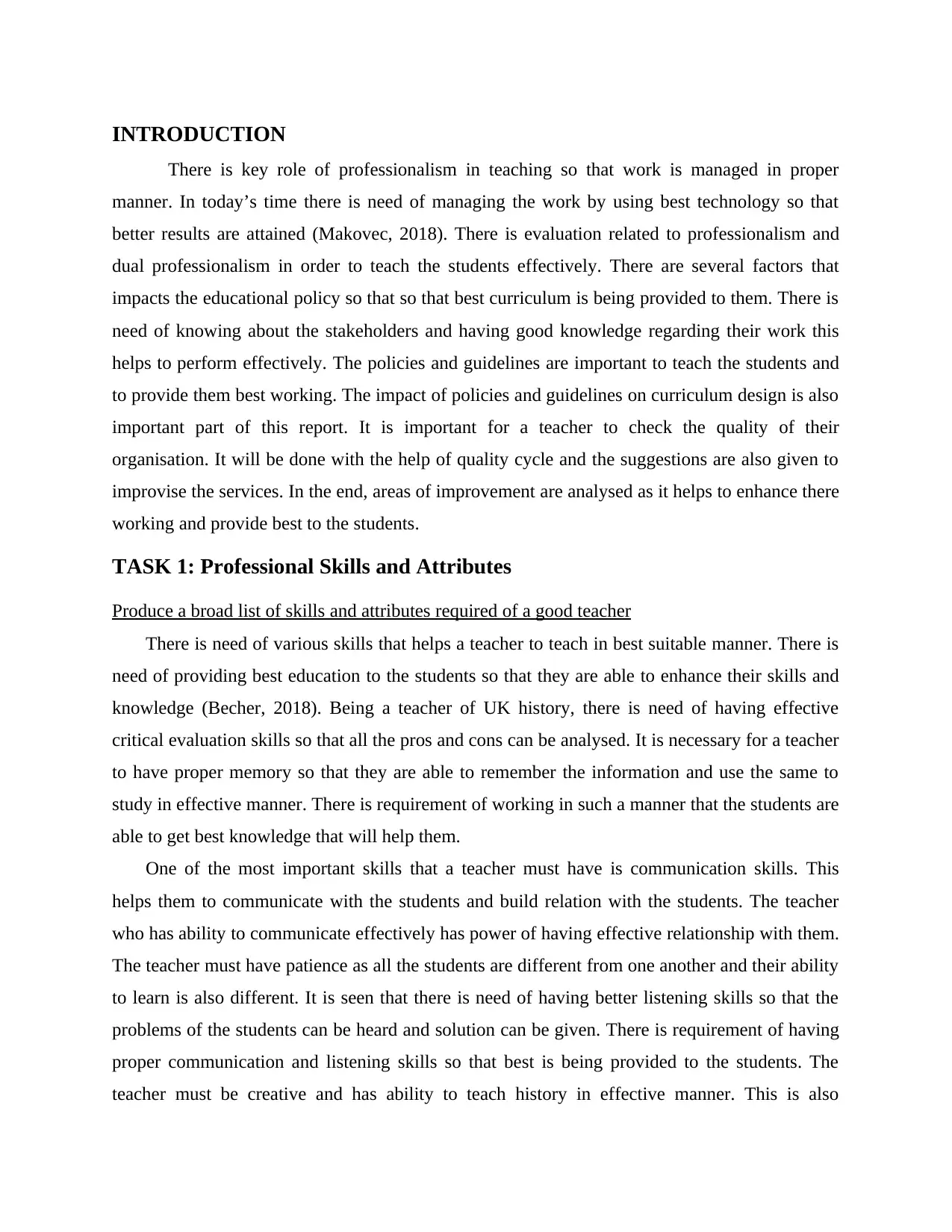
INTRODUCTION
There is key role of professionalism in teaching so that work is managed in proper
manner. In today’s time there is need of managing the work by using best technology so that
better results are attained (Makovec, 2018). There is evaluation related to professionalism and
dual professionalism in order to teach the students effectively. There are several factors that
impacts the educational policy so that so that best curriculum is being provided to them. There is
need of knowing about the stakeholders and having good knowledge regarding their work this
helps to perform effectively. The policies and guidelines are important to teach the students and
to provide them best working. The impact of policies and guidelines on curriculum design is also
important part of this report. It is important for a teacher to check the quality of their
organisation. It will be done with the help of quality cycle and the suggestions are also given to
improvise the services. In the end, areas of improvement are analysed as it helps to enhance there
working and provide best to the students.
TASK 1: Professional Skills and Attributes
Produce a broad list of skills and attributes required of a good teacher
There is need of various skills that helps a teacher to teach in best suitable manner. There is
need of providing best education to the students so that they are able to enhance their skills and
knowledge (Becher, 2018). Being a teacher of UK history, there is need of having effective
critical evaluation skills so that all the pros and cons can be analysed. It is necessary for a teacher
to have proper memory so that they are able to remember the information and use the same to
study in effective manner. There is requirement of working in such a manner that the students are
able to get best knowledge that will help them.
One of the most important skills that a teacher must have is communication skills. This
helps them to communicate with the students and build relation with the students. The teacher
who has ability to communicate effectively has power of having effective relationship with them.
The teacher must have patience as all the students are different from one another and their ability
to learn is also different. It is seen that there is need of having better listening skills so that the
problems of the students can be heard and solution can be given. There is requirement of having
proper communication and listening skills so that best is being provided to the students. The
teacher must be creative and has ability to teach history in effective manner. This is also
There is key role of professionalism in teaching so that work is managed in proper
manner. In today’s time there is need of managing the work by using best technology so that
better results are attained (Makovec, 2018). There is evaluation related to professionalism and
dual professionalism in order to teach the students effectively. There are several factors that
impacts the educational policy so that so that best curriculum is being provided to them. There is
need of knowing about the stakeholders and having good knowledge regarding their work this
helps to perform effectively. The policies and guidelines are important to teach the students and
to provide them best working. The impact of policies and guidelines on curriculum design is also
important part of this report. It is important for a teacher to check the quality of their
organisation. It will be done with the help of quality cycle and the suggestions are also given to
improvise the services. In the end, areas of improvement are analysed as it helps to enhance there
working and provide best to the students.
TASK 1: Professional Skills and Attributes
Produce a broad list of skills and attributes required of a good teacher
There is need of various skills that helps a teacher to teach in best suitable manner. There is
need of providing best education to the students so that they are able to enhance their skills and
knowledge (Becher, 2018). Being a teacher of UK history, there is need of having effective
critical evaluation skills so that all the pros and cons can be analysed. It is necessary for a teacher
to have proper memory so that they are able to remember the information and use the same to
study in effective manner. There is requirement of working in such a manner that the students are
able to get best knowledge that will help them.
One of the most important skills that a teacher must have is communication skills. This
helps them to communicate with the students and build relation with the students. The teacher
who has ability to communicate effectively has power of having effective relationship with them.
The teacher must have patience as all the students are different from one another and their ability
to learn is also different. It is seen that there is need of having better listening skills so that the
problems of the students can be heard and solution can be given. There is requirement of having
proper communication and listening skills so that best is being provided to the students. The
teacher must be creative and has ability to teach history in effective manner. This is also
Paraphrase This Document
Need a fresh take? Get an instant paraphrase of this document with our AI Paraphraser
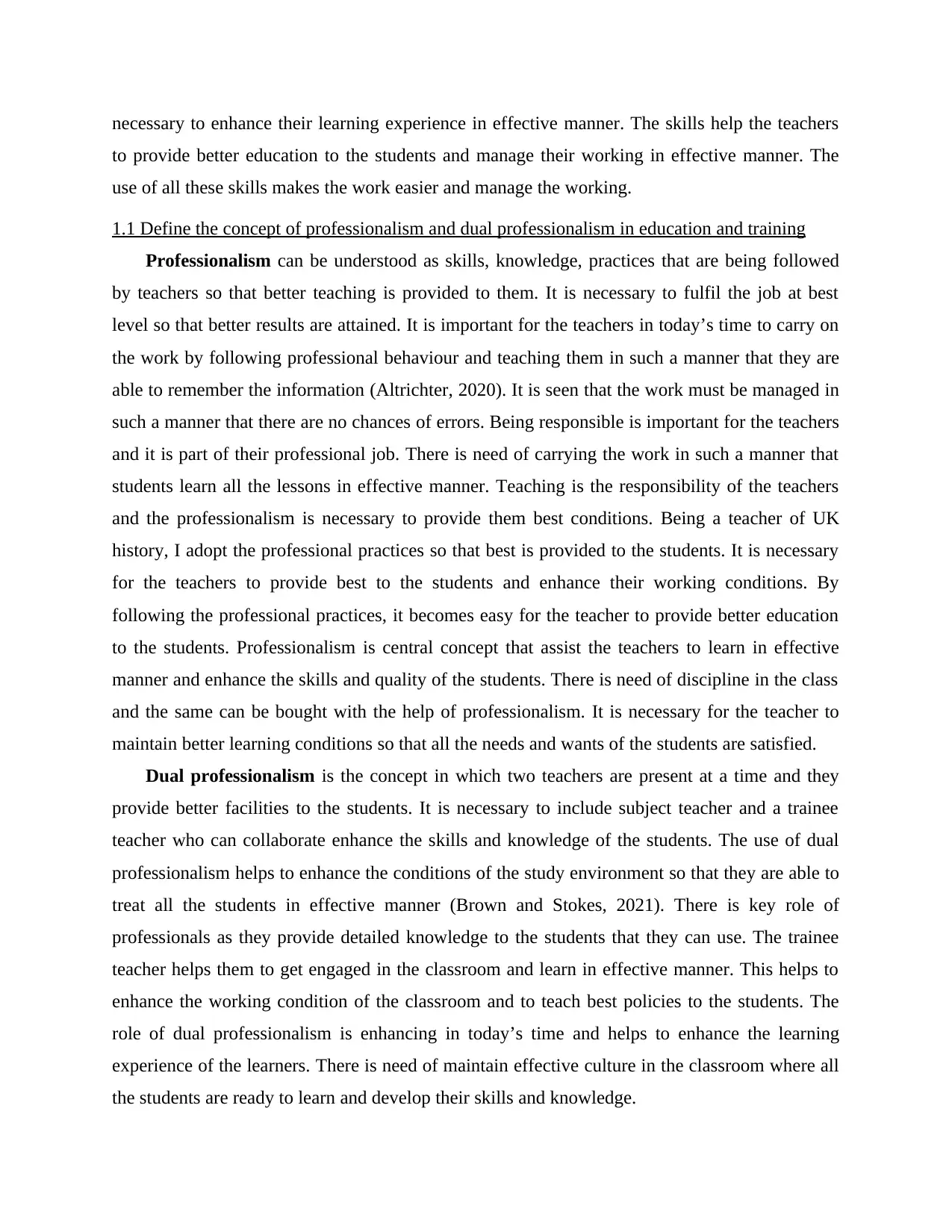
necessary to enhance their learning experience in effective manner. The skills help the teachers
to provide better education to the students and manage their working in effective manner. The
use of all these skills makes the work easier and manage the working.
1.1 Define the concept of professionalism and dual professionalism in education and training
Professionalism can be understood as skills, knowledge, practices that are being followed
by teachers so that better teaching is provided to them. It is necessary to fulfil the job at best
level so that better results are attained. It is important for the teachers in today’s time to carry on
the work by following professional behaviour and teaching them in such a manner that they are
able to remember the information (Altrichter, 2020). It is seen that the work must be managed in
such a manner that there are no chances of errors. Being responsible is important for the teachers
and it is part of their professional job. There is need of carrying the work in such a manner that
students learn all the lessons in effective manner. Teaching is the responsibility of the teachers
and the professionalism is necessary to provide them best conditions. Being a teacher of UK
history, I adopt the professional practices so that best is provided to the students. It is necessary
for the teachers to provide best to the students and enhance their working conditions. By
following the professional practices, it becomes easy for the teacher to provide better education
to the students. Professionalism is central concept that assist the teachers to learn in effective
manner and enhance the skills and quality of the students. There is need of discipline in the class
and the same can be bought with the help of professionalism. It is necessary for the teacher to
maintain better learning conditions so that all the needs and wants of the students are satisfied.
Dual professionalism is the concept in which two teachers are present at a time and they
provide better facilities to the students. It is necessary to include subject teacher and a trainee
teacher who can collaborate enhance the skills and knowledge of the students. The use of dual
professionalism helps to enhance the conditions of the study environment so that they are able to
treat all the students in effective manner (Brown and Stokes, 2021). There is key role of
professionals as they provide detailed knowledge to the students that they can use. The trainee
teacher helps them to get engaged in the classroom and learn in effective manner. This helps to
enhance the working condition of the classroom and to teach best policies to the students. The
role of dual professionalism is enhancing in today’s time and helps to enhance the learning
experience of the learners. There is need of maintain effective culture in the classroom where all
the students are ready to learn and develop their skills and knowledge.
to provide better education to the students and manage their working in effective manner. The
use of all these skills makes the work easier and manage the working.
1.1 Define the concept of professionalism and dual professionalism in education and training
Professionalism can be understood as skills, knowledge, practices that are being followed
by teachers so that better teaching is provided to them. It is necessary to fulfil the job at best
level so that better results are attained. It is important for the teachers in today’s time to carry on
the work by following professional behaviour and teaching them in such a manner that they are
able to remember the information (Altrichter, 2020). It is seen that the work must be managed in
such a manner that there are no chances of errors. Being responsible is important for the teachers
and it is part of their professional job. There is need of carrying the work in such a manner that
students learn all the lessons in effective manner. Teaching is the responsibility of the teachers
and the professionalism is necessary to provide them best conditions. Being a teacher of UK
history, I adopt the professional practices so that best is provided to the students. It is necessary
for the teachers to provide best to the students and enhance their working conditions. By
following the professional practices, it becomes easy for the teacher to provide better education
to the students. Professionalism is central concept that assist the teachers to learn in effective
manner and enhance the skills and quality of the students. There is need of discipline in the class
and the same can be bought with the help of professionalism. It is necessary for the teacher to
maintain better learning conditions so that all the needs and wants of the students are satisfied.
Dual professionalism is the concept in which two teachers are present at a time and they
provide better facilities to the students. It is necessary to include subject teacher and a trainee
teacher who can collaborate enhance the skills and knowledge of the students. The use of dual
professionalism helps to enhance the conditions of the study environment so that they are able to
treat all the students in effective manner (Brown and Stokes, 2021). There is key role of
professionals as they provide detailed knowledge to the students that they can use. The trainee
teacher helps them to get engaged in the classroom and learn in effective manner. This helps to
enhance the working condition of the classroom and to teach best policies to the students. The
role of dual professionalism is enhancing in today’s time and helps to enhance the learning
experience of the learners. There is need of maintain effective culture in the classroom where all
the students are ready to learn and develop their skills and knowledge.
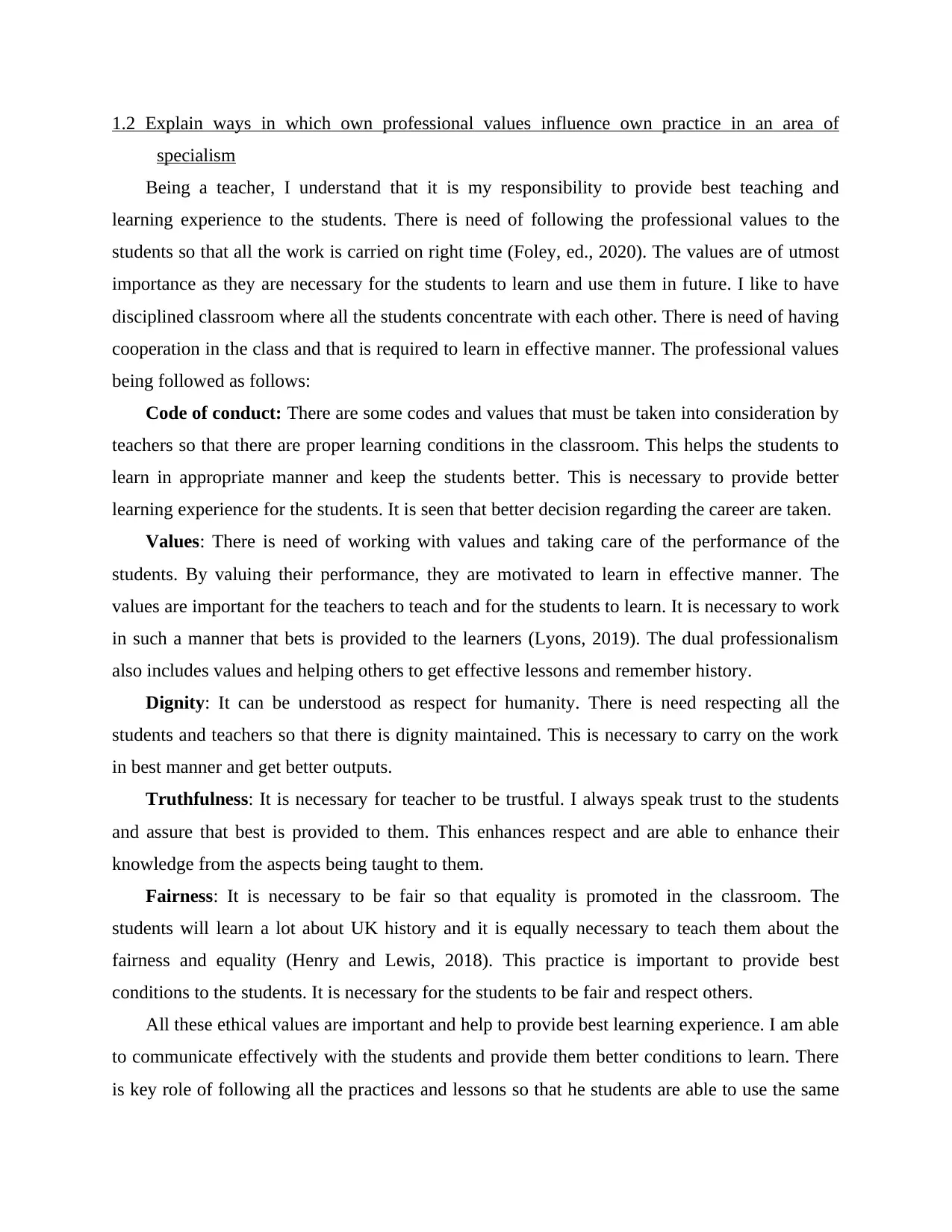
1.2 Explain ways in which own professional values influence own practice in an area of
specialism
Being a teacher, I understand that it is my responsibility to provide best teaching and
learning experience to the students. There is need of following the professional values to the
students so that all the work is carried on right time (Foley, ed., 2020). The values are of utmost
importance as they are necessary for the students to learn and use them in future. I like to have
disciplined classroom where all the students concentrate with each other. There is need of having
cooperation in the class and that is required to learn in effective manner. The professional values
being followed as follows:
Code of conduct: There are some codes and values that must be taken into consideration by
teachers so that there are proper learning conditions in the classroom. This helps the students to
learn in appropriate manner and keep the students better. This is necessary to provide better
learning experience for the students. It is seen that better decision regarding the career are taken.
Values: There is need of working with values and taking care of the performance of the
students. By valuing their performance, they are motivated to learn in effective manner. The
values are important for the teachers to teach and for the students to learn. It is necessary to work
in such a manner that bets is provided to the learners (Lyons, 2019). The dual professionalism
also includes values and helping others to get effective lessons and remember history.
Dignity: It can be understood as respect for humanity. There is need respecting all the
students and teachers so that there is dignity maintained. This is necessary to carry on the work
in best manner and get better outputs.
Truthfulness: It is necessary for teacher to be trustful. I always speak trust to the students
and assure that best is provided to them. This enhances respect and are able to enhance their
knowledge from the aspects being taught to them.
Fairness: It is necessary to be fair so that equality is promoted in the classroom. The
students will learn a lot about UK history and it is equally necessary to teach them about the
fairness and equality (Henry and Lewis, 2018). This practice is important to provide best
conditions to the students. It is necessary for the students to be fair and respect others.
All these ethical values are important and help to provide best learning experience. I am able
to communicate effectively with the students and provide them better conditions to learn. There
is key role of following all the practices and lessons so that he students are able to use the same
specialism
Being a teacher, I understand that it is my responsibility to provide best teaching and
learning experience to the students. There is need of following the professional values to the
students so that all the work is carried on right time (Foley, ed., 2020). The values are of utmost
importance as they are necessary for the students to learn and use them in future. I like to have
disciplined classroom where all the students concentrate with each other. There is need of having
cooperation in the class and that is required to learn in effective manner. The professional values
being followed as follows:
Code of conduct: There are some codes and values that must be taken into consideration by
teachers so that there are proper learning conditions in the classroom. This helps the students to
learn in appropriate manner and keep the students better. This is necessary to provide better
learning experience for the students. It is seen that better decision regarding the career are taken.
Values: There is need of working with values and taking care of the performance of the
students. By valuing their performance, they are motivated to learn in effective manner. The
values are important for the teachers to teach and for the students to learn. It is necessary to work
in such a manner that bets is provided to the learners (Lyons, 2019). The dual professionalism
also includes values and helping others to get effective lessons and remember history.
Dignity: It can be understood as respect for humanity. There is need respecting all the
students and teachers so that there is dignity maintained. This is necessary to carry on the work
in best manner and get better outputs.
Truthfulness: It is necessary for teacher to be trustful. I always speak trust to the students
and assure that best is provided to them. This enhances respect and are able to enhance their
knowledge from the aspects being taught to them.
Fairness: It is necessary to be fair so that equality is promoted in the classroom. The
students will learn a lot about UK history and it is equally necessary to teach them about the
fairness and equality (Henry and Lewis, 2018). This practice is important to provide best
conditions to the students. It is necessary for the students to be fair and respect others.
All these ethical values are important and help to provide best learning experience. I am able
to communicate effectively with the students and provide them better conditions to learn. There
is key role of following all the practices and lessons so that he students are able to use the same
⊘ This is a preview!⊘
Do you want full access?
Subscribe today to unlock all pages.

Trusted by 1+ million students worldwide
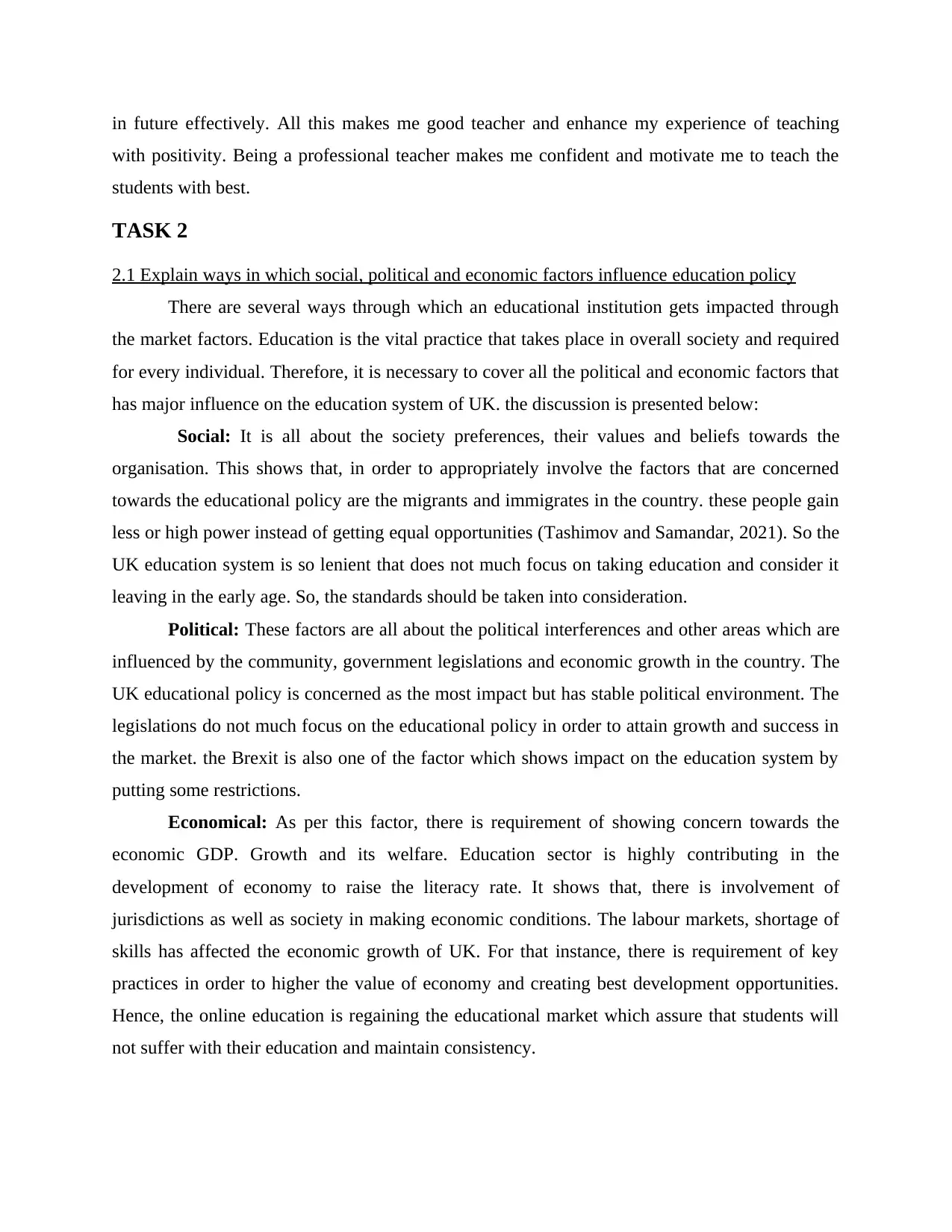
in future effectively. All this makes me good teacher and enhance my experience of teaching
with positivity. Being a professional teacher makes me confident and motivate me to teach the
students with best.
TASK 2
2.1 Explain ways in which social, political and economic factors influence education policy
There are several ways through which an educational institution gets impacted through
the market factors. Education is the vital practice that takes place in overall society and required
for every individual. Therefore, it is necessary to cover all the political and economic factors that
has major influence on the education system of UK. the discussion is presented below:
Social: It is all about the society preferences, their values and beliefs towards the
organisation. This shows that, in order to appropriately involve the factors that are concerned
towards the educational policy are the migrants and immigrates in the country. these people gain
less or high power instead of getting equal opportunities (Tashimov and Samandar, 2021). So the
UK education system is so lenient that does not much focus on taking education and consider it
leaving in the early age. So, the standards should be taken into consideration.
Political: These factors are all about the political interferences and other areas which are
influenced by the community, government legislations and economic growth in the country. The
UK educational policy is concerned as the most impact but has stable political environment. The
legislations do not much focus on the educational policy in order to attain growth and success in
the market. the Brexit is also one of the factor which shows impact on the education system by
putting some restrictions.
Economical: As per this factor, there is requirement of showing concern towards the
economic GDP. Growth and its welfare. Education sector is highly contributing in the
development of economy to raise the literacy rate. It shows that, there is involvement of
jurisdictions as well as society in making economic conditions. The labour markets, shortage of
skills has affected the economic growth of UK. For that instance, there is requirement of key
practices in order to higher the value of economy and creating best development opportunities.
Hence, the online education is regaining the educational market which assure that students will
not suffer with their education and maintain consistency.
with positivity. Being a professional teacher makes me confident and motivate me to teach the
students with best.
TASK 2
2.1 Explain ways in which social, political and economic factors influence education policy
There are several ways through which an educational institution gets impacted through
the market factors. Education is the vital practice that takes place in overall society and required
for every individual. Therefore, it is necessary to cover all the political and economic factors that
has major influence on the education system of UK. the discussion is presented below:
Social: It is all about the society preferences, their values and beliefs towards the
organisation. This shows that, in order to appropriately involve the factors that are concerned
towards the educational policy are the migrants and immigrates in the country. these people gain
less or high power instead of getting equal opportunities (Tashimov and Samandar, 2021). So the
UK education system is so lenient that does not much focus on taking education and consider it
leaving in the early age. So, the standards should be taken into consideration.
Political: These factors are all about the political interferences and other areas which are
influenced by the community, government legislations and economic growth in the country. The
UK educational policy is concerned as the most impact but has stable political environment. The
legislations do not much focus on the educational policy in order to attain growth and success in
the market. the Brexit is also one of the factor which shows impact on the education system by
putting some restrictions.
Economical: As per this factor, there is requirement of showing concern towards the
economic GDP. Growth and its welfare. Education sector is highly contributing in the
development of economy to raise the literacy rate. It shows that, there is involvement of
jurisdictions as well as society in making economic conditions. The labour markets, shortage of
skills has affected the economic growth of UK. For that instance, there is requirement of key
practices in order to higher the value of economy and creating best development opportunities.
Hence, the online education is regaining the educational market which assure that students will
not suffer with their education and maintain consistency.
Paraphrase This Document
Need a fresh take? Get an instant paraphrase of this document with our AI Paraphraser
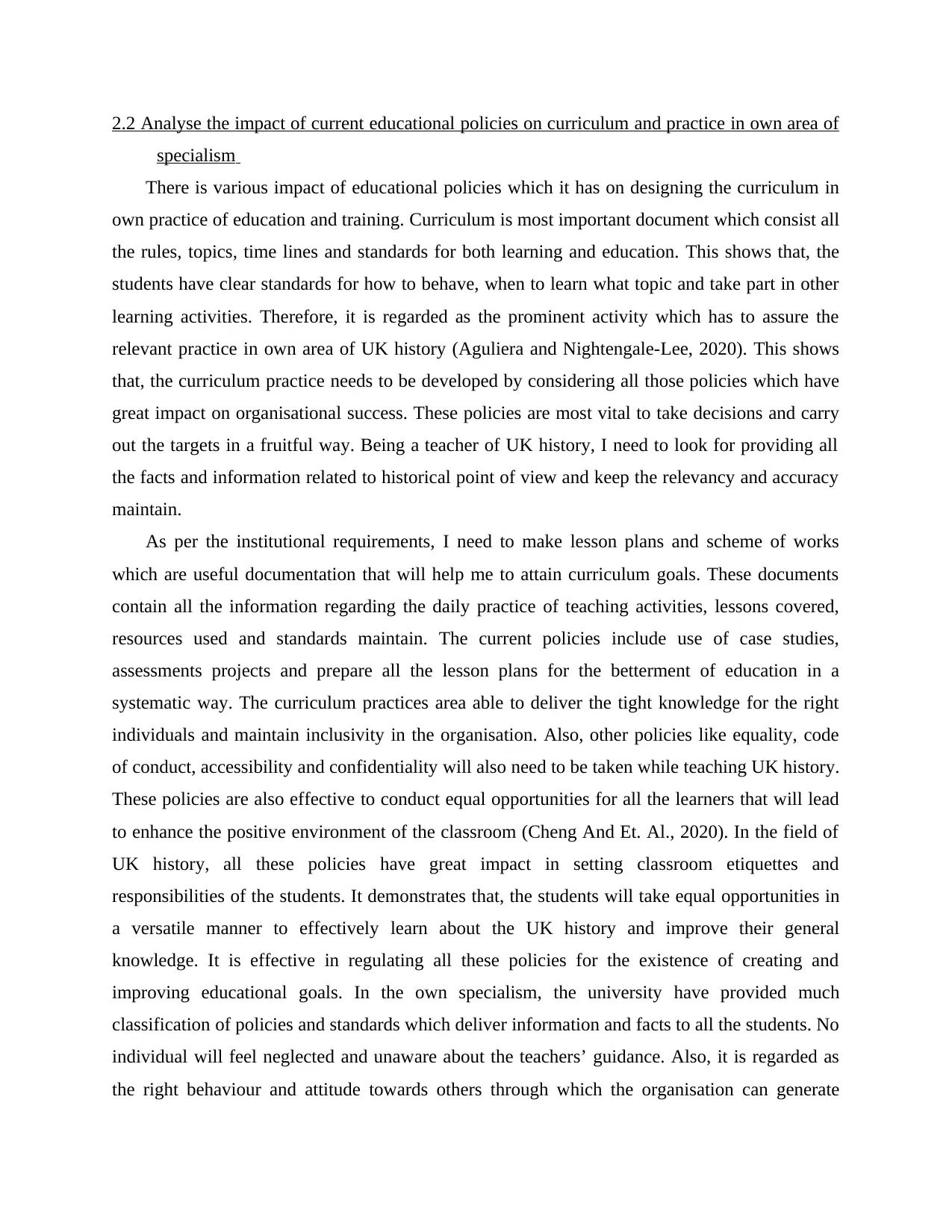
2.2 Analyse the impact of current educational policies on curriculum and practice in own area of
specialism
There is various impact of educational policies which it has on designing the curriculum in
own practice of education and training. Curriculum is most important document which consist all
the rules, topics, time lines and standards for both learning and education. This shows that, the
students have clear standards for how to behave, when to learn what topic and take part in other
learning activities. Therefore, it is regarded as the prominent activity which has to assure the
relevant practice in own area of UK history (Aguliera and Nightengale-Lee, 2020). This shows
that, the curriculum practice needs to be developed by considering all those policies which have
great impact on organisational success. These policies are most vital to take decisions and carry
out the targets in a fruitful way. Being a teacher of UK history, I need to look for providing all
the facts and information related to historical point of view and keep the relevancy and accuracy
maintain.
As per the institutional requirements, I need to make lesson plans and scheme of works
which are useful documentation that will help me to attain curriculum goals. These documents
contain all the information regarding the daily practice of teaching activities, lessons covered,
resources used and standards maintain. The current policies include use of case studies,
assessments projects and prepare all the lesson plans for the betterment of education in a
systematic way. The curriculum practices area able to deliver the tight knowledge for the right
individuals and maintain inclusivity in the organisation. Also, other policies like equality, code
of conduct, accessibility and confidentiality will also need to be taken while teaching UK history.
These policies are also effective to conduct equal opportunities for all the learners that will lead
to enhance the positive environment of the classroom (Cheng And Et. Al., 2020). In the field of
UK history, all these policies have great impact in setting classroom etiquettes and
responsibilities of the students. It demonstrates that, the students will take equal opportunities in
a versatile manner to effectively learn about the UK history and improve their general
knowledge. It is effective in regulating all these policies for the existence of creating and
improving educational goals. In the own specialism, the university have provided much
classification of policies and standards which deliver information and facts to all the students. No
individual will feel neglected and unaware about the teachers’ guidance. Also, it is regarded as
the right behaviour and attitude towards others through which the organisation can generate
specialism
There is various impact of educational policies which it has on designing the curriculum in
own practice of education and training. Curriculum is most important document which consist all
the rules, topics, time lines and standards for both learning and education. This shows that, the
students have clear standards for how to behave, when to learn what topic and take part in other
learning activities. Therefore, it is regarded as the prominent activity which has to assure the
relevant practice in own area of UK history (Aguliera and Nightengale-Lee, 2020). This shows
that, the curriculum practice needs to be developed by considering all those policies which have
great impact on organisational success. These policies are most vital to take decisions and carry
out the targets in a fruitful way. Being a teacher of UK history, I need to look for providing all
the facts and information related to historical point of view and keep the relevancy and accuracy
maintain.
As per the institutional requirements, I need to make lesson plans and scheme of works
which are useful documentation that will help me to attain curriculum goals. These documents
contain all the information regarding the daily practice of teaching activities, lessons covered,
resources used and standards maintain. The current policies include use of case studies,
assessments projects and prepare all the lesson plans for the betterment of education in a
systematic way. The curriculum practices area able to deliver the tight knowledge for the right
individuals and maintain inclusivity in the organisation. Also, other policies like equality, code
of conduct, accessibility and confidentiality will also need to be taken while teaching UK history.
These policies are also effective to conduct equal opportunities for all the learners that will lead
to enhance the positive environment of the classroom (Cheng And Et. Al., 2020). In the field of
UK history, all these policies have great impact in setting classroom etiquettes and
responsibilities of the students. It demonstrates that, the students will take equal opportunities in
a versatile manner to effectively learn about the UK history and improve their general
knowledge. It is effective in regulating all these policies for the existence of creating and
improving educational goals. In the own specialism, the university have provided much
classification of policies and standards which deliver information and facts to all the students. No
individual will feel neglected and unaware about the teachers’ guidance. Also, it is regarded as
the right behaviour and attitude towards others through which the organisation can generate
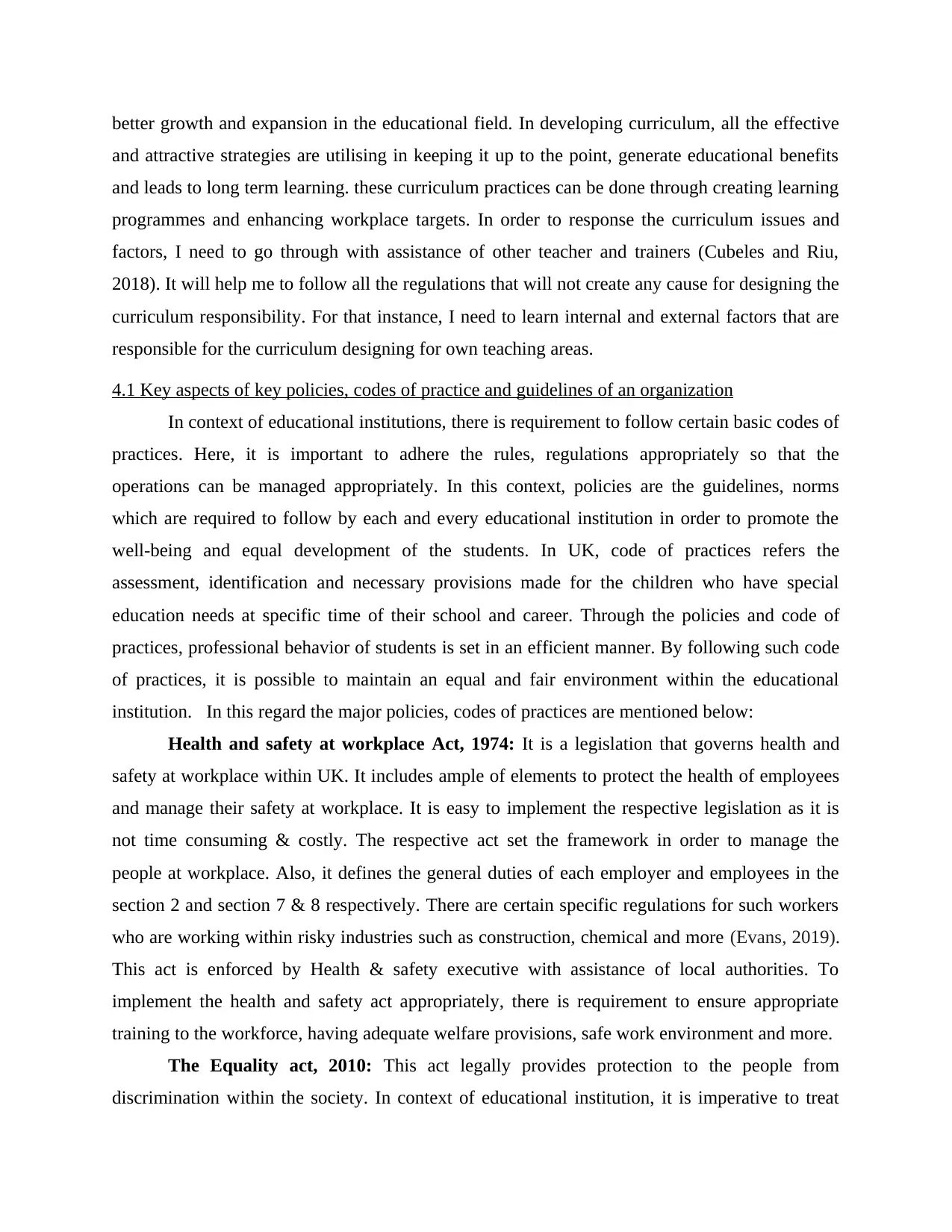
better growth and expansion in the educational field. In developing curriculum, all the effective
and attractive strategies are utilising in keeping it up to the point, generate educational benefits
and leads to long term learning. these curriculum practices can be done through creating learning
programmes and enhancing workplace targets. In order to response the curriculum issues and
factors, I need to go through with assistance of other teacher and trainers (Cubeles and Riu,
2018). It will help me to follow all the regulations that will not create any cause for designing the
curriculum responsibility. For that instance, I need to learn internal and external factors that are
responsible for the curriculum designing for own teaching areas.
4.1 Key aspects of key policies, codes of practice and guidelines of an organization
In context of educational institutions, there is requirement to follow certain basic codes of
practices. Here, it is important to adhere the rules, regulations appropriately so that the
operations can be managed appropriately. In this context, policies are the guidelines, norms
which are required to follow by each and every educational institution in order to promote the
well-being and equal development of the students. In UK, code of practices refers the
assessment, identification and necessary provisions made for the children who have special
education needs at specific time of their school and career. Through the policies and code of
practices, professional behavior of students is set in an efficient manner. By following such code
of practices, it is possible to maintain an equal and fair environment within the educational
institution. In this regard the major policies, codes of practices are mentioned below:
Health and safety at workplace Act, 1974: It is a legislation that governs health and
safety at workplace within UK. It includes ample of elements to protect the health of employees
and manage their safety at workplace. It is easy to implement the respective legislation as it is
not time consuming & costly. The respective act set the framework in order to manage the
people at workplace. Also, it defines the general duties of each employer and employees in the
section 2 and section 7 & 8 respectively. There are certain specific regulations for such workers
who are working within risky industries such as construction, chemical and more (Evans, 2019).
This act is enforced by Health & safety executive with assistance of local authorities. To
implement the health and safety act appropriately, there is requirement to ensure appropriate
training to the workforce, having adequate welfare provisions, safe work environment and more.
The Equality act, 2010: This act legally provides protection to the people from
discrimination within the society. In context of educational institution, it is imperative to treat
and attractive strategies are utilising in keeping it up to the point, generate educational benefits
and leads to long term learning. these curriculum practices can be done through creating learning
programmes and enhancing workplace targets. In order to response the curriculum issues and
factors, I need to go through with assistance of other teacher and trainers (Cubeles and Riu,
2018). It will help me to follow all the regulations that will not create any cause for designing the
curriculum responsibility. For that instance, I need to learn internal and external factors that are
responsible for the curriculum designing for own teaching areas.
4.1 Key aspects of key policies, codes of practice and guidelines of an organization
In context of educational institutions, there is requirement to follow certain basic codes of
practices. Here, it is important to adhere the rules, regulations appropriately so that the
operations can be managed appropriately. In this context, policies are the guidelines, norms
which are required to follow by each and every educational institution in order to promote the
well-being and equal development of the students. In UK, code of practices refers the
assessment, identification and necessary provisions made for the children who have special
education needs at specific time of their school and career. Through the policies and code of
practices, professional behavior of students is set in an efficient manner. By following such code
of practices, it is possible to maintain an equal and fair environment within the educational
institution. In this regard the major policies, codes of practices are mentioned below:
Health and safety at workplace Act, 1974: It is a legislation that governs health and
safety at workplace within UK. It includes ample of elements to protect the health of employees
and manage their safety at workplace. It is easy to implement the respective legislation as it is
not time consuming & costly. The respective act set the framework in order to manage the
people at workplace. Also, it defines the general duties of each employer and employees in the
section 2 and section 7 & 8 respectively. There are certain specific regulations for such workers
who are working within risky industries such as construction, chemical and more (Evans, 2019).
This act is enforced by Health & safety executive with assistance of local authorities. To
implement the health and safety act appropriately, there is requirement to ensure appropriate
training to the workforce, having adequate welfare provisions, safe work environment and more.
The Equality act, 2010: This act legally provides protection to the people from
discrimination within the society. In context of educational institution, it is imperative to treat
⊘ This is a preview!⊘
Do you want full access?
Subscribe today to unlock all pages.

Trusted by 1+ million students worldwide
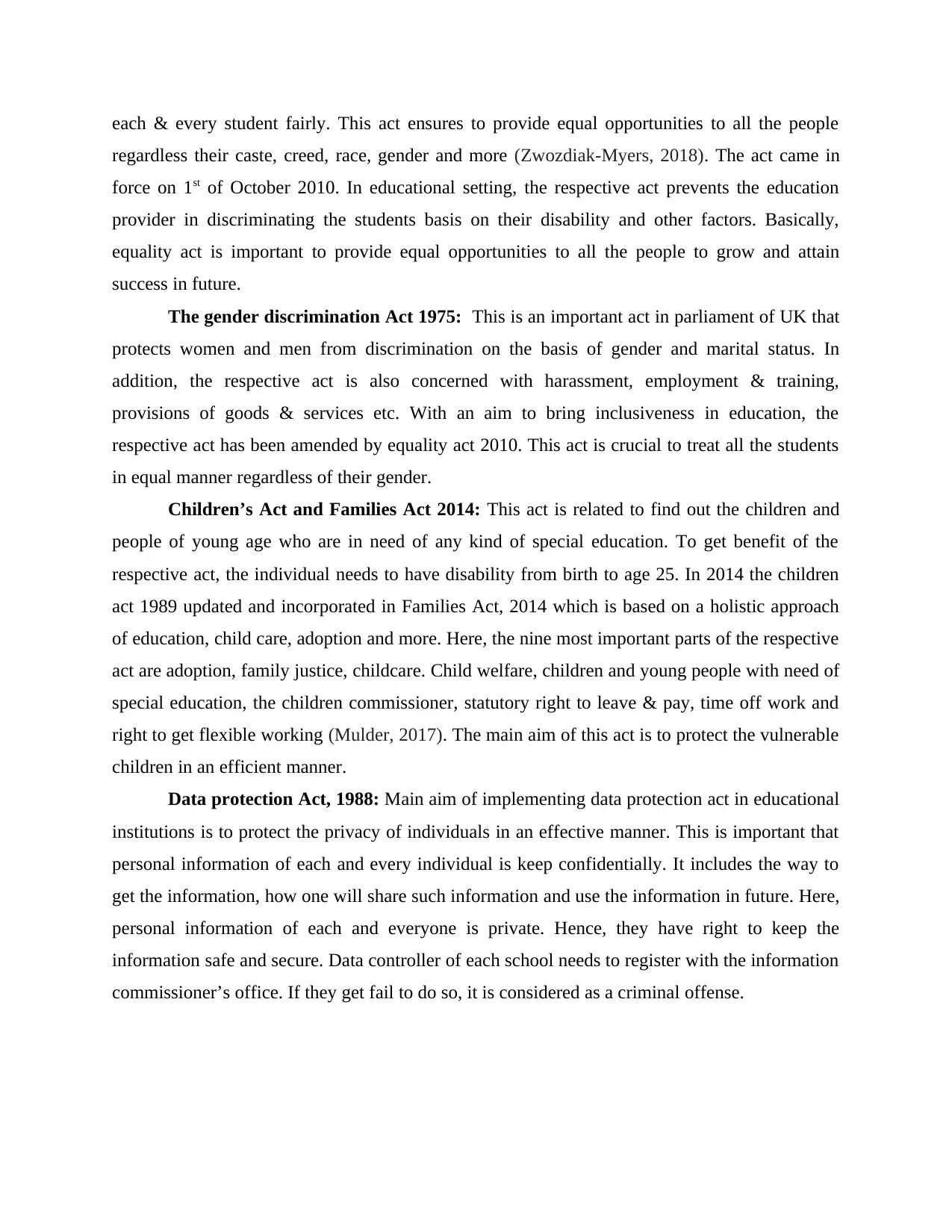
each & every student fairly. This act ensures to provide equal opportunities to all the people
regardless their caste, creed, race, gender and more (Zwozdiak-Myers, 2018). The act came in
force on 1st of October 2010. In educational setting, the respective act prevents the education
provider in discriminating the students basis on their disability and other factors. Basically,
equality act is important to provide equal opportunities to all the people to grow and attain
success in future.
The gender discrimination Act 1975: This is an important act in parliament of UK that
protects women and men from discrimination on the basis of gender and marital status. In
addition, the respective act is also concerned with harassment, employment & training,
provisions of goods & services etc. With an aim to bring inclusiveness in education, the
respective act has been amended by equality act 2010. This act is crucial to treat all the students
in equal manner regardless of their gender.
Children’s Act and Families Act 2014: This act is related to find out the children and
people of young age who are in need of any kind of special education. To get benefit of the
respective act, the individual needs to have disability from birth to age 25. In 2014 the children
act 1989 updated and incorporated in Families Act, 2014 which is based on a holistic approach
of education, child care, adoption and more. Here, the nine most important parts of the respective
act are adoption, family justice, childcare. Child welfare, children and young people with need of
special education, the children commissioner, statutory right to leave & pay, time off work and
right to get flexible working (Mulder, 2017). The main aim of this act is to protect the vulnerable
children in an efficient manner.
Data protection Act, 1988: Main aim of implementing data protection act in educational
institutions is to protect the privacy of individuals in an effective manner. This is important that
personal information of each and every individual is keep confidentially. It includes the way to
get the information, how one will share such information and use the information in future. Here,
personal information of each and everyone is private. Hence, they have right to keep the
information safe and secure. Data controller of each school needs to register with the information
commissioner’s office. If they get fail to do so, it is considered as a criminal offense.
regardless their caste, creed, race, gender and more (Zwozdiak-Myers, 2018). The act came in
force on 1st of October 2010. In educational setting, the respective act prevents the education
provider in discriminating the students basis on their disability and other factors. Basically,
equality act is important to provide equal opportunities to all the people to grow and attain
success in future.
The gender discrimination Act 1975: This is an important act in parliament of UK that
protects women and men from discrimination on the basis of gender and marital status. In
addition, the respective act is also concerned with harassment, employment & training,
provisions of goods & services etc. With an aim to bring inclusiveness in education, the
respective act has been amended by equality act 2010. This act is crucial to treat all the students
in equal manner regardless of their gender.
Children’s Act and Families Act 2014: This act is related to find out the children and
people of young age who are in need of any kind of special education. To get benefit of the
respective act, the individual needs to have disability from birth to age 25. In 2014 the children
act 1989 updated and incorporated in Families Act, 2014 which is based on a holistic approach
of education, child care, adoption and more. Here, the nine most important parts of the respective
act are adoption, family justice, childcare. Child welfare, children and young people with need of
special education, the children commissioner, statutory right to leave & pay, time off work and
right to get flexible working (Mulder, 2017). The main aim of this act is to protect the vulnerable
children in an efficient manner.
Data protection Act, 1988: Main aim of implementing data protection act in educational
institutions is to protect the privacy of individuals in an effective manner. This is important that
personal information of each and every individual is keep confidentially. It includes the way to
get the information, how one will share such information and use the information in future. Here,
personal information of each and everyone is private. Hence, they have right to keep the
information safe and secure. Data controller of each school needs to register with the information
commissioner’s office. If they get fail to do so, it is considered as a criminal offense.
Paraphrase This Document
Need a fresh take? Get an instant paraphrase of this document with our AI Paraphraser
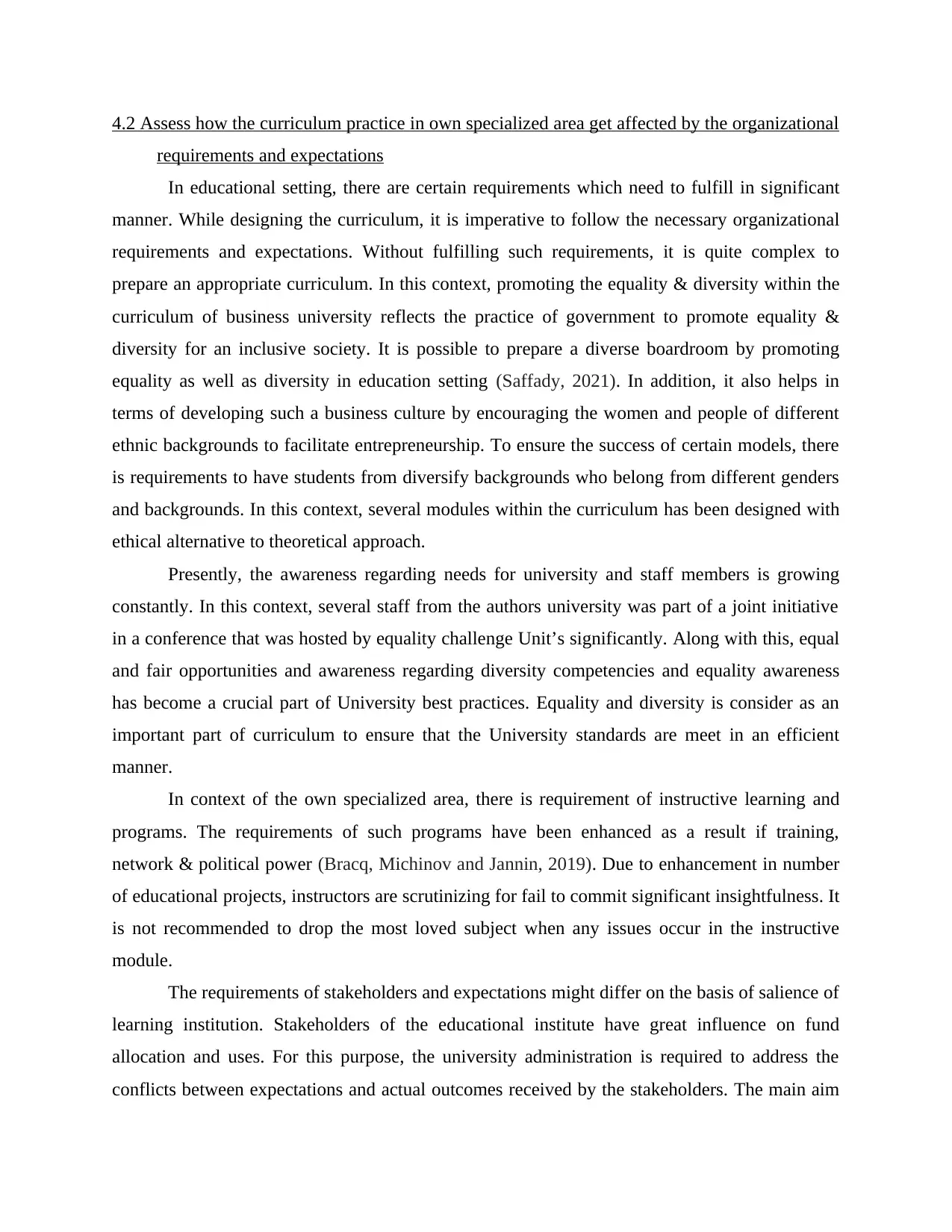
4.2 Assess how the curriculum practice in own specialized area get affected by the organizational
requirements and expectations
In educational setting, there are certain requirements which need to fulfill in significant
manner. While designing the curriculum, it is imperative to follow the necessary organizational
requirements and expectations. Without fulfilling such requirements, it is quite complex to
prepare an appropriate curriculum. In this context, promoting the equality & diversity within the
curriculum of business university reflects the practice of government to promote equality &
diversity for an inclusive society. It is possible to prepare a diverse boardroom by promoting
equality as well as diversity in education setting (Saffady, 2021). In addition, it also helps in
terms of developing such a business culture by encouraging the women and people of different
ethnic backgrounds to facilitate entrepreneurship. To ensure the success of certain models, there
is requirements to have students from diversify backgrounds who belong from different genders
and backgrounds. In this context, several modules within the curriculum has been designed with
ethical alternative to theoretical approach.
Presently, the awareness regarding needs for university and staff members is growing
constantly. In this context, several staff from the authors university was part of a joint initiative
in a conference that was hosted by equality challenge Unit’s significantly. Along with this, equal
and fair opportunities and awareness regarding diversity competencies and equality awareness
has become a crucial part of University best practices. Equality and diversity is consider as an
important part of curriculum to ensure that the University standards are meet in an efficient
manner.
In context of the own specialized area, there is requirement of instructive learning and
programs. The requirements of such programs have been enhanced as a result if training,
network & political power (Bracq, Michinov and Jannin, 2019). Due to enhancement in number
of educational projects, instructors are scrutinizing for fail to commit significant insightfulness. It
is not recommended to drop the most loved subject when any issues occur in the instructive
module.
The requirements of stakeholders and expectations might differ on the basis of salience of
learning institution. Stakeholders of the educational institute have great influence on fund
allocation and uses. For this purpose, the university administration is required to address the
conflicts between expectations and actual outcomes received by the stakeholders. The main aim
requirements and expectations
In educational setting, there are certain requirements which need to fulfill in significant
manner. While designing the curriculum, it is imperative to follow the necessary organizational
requirements and expectations. Without fulfilling such requirements, it is quite complex to
prepare an appropriate curriculum. In this context, promoting the equality & diversity within the
curriculum of business university reflects the practice of government to promote equality &
diversity for an inclusive society. It is possible to prepare a diverse boardroom by promoting
equality as well as diversity in education setting (Saffady, 2021). In addition, it also helps in
terms of developing such a business culture by encouraging the women and people of different
ethnic backgrounds to facilitate entrepreneurship. To ensure the success of certain models, there
is requirements to have students from diversify backgrounds who belong from different genders
and backgrounds. In this context, several modules within the curriculum has been designed with
ethical alternative to theoretical approach.
Presently, the awareness regarding needs for university and staff members is growing
constantly. In this context, several staff from the authors university was part of a joint initiative
in a conference that was hosted by equality challenge Unit’s significantly. Along with this, equal
and fair opportunities and awareness regarding diversity competencies and equality awareness
has become a crucial part of University best practices. Equality and diversity is consider as an
important part of curriculum to ensure that the University standards are meet in an efficient
manner.
In context of the own specialized area, there is requirement of instructive learning and
programs. The requirements of such programs have been enhanced as a result if training,
network & political power (Bracq, Michinov and Jannin, 2019). Due to enhancement in number
of educational projects, instructors are scrutinizing for fail to commit significant insightfulness. It
is not recommended to drop the most loved subject when any issues occur in the instructive
module.
The requirements of stakeholders and expectations might differ on the basis of salience of
learning institution. Stakeholders of the educational institute have great influence on fund
allocation and uses. For this purpose, the university administration is required to address the
conflicts between expectations and actual outcomes received by the stakeholders. The main aim
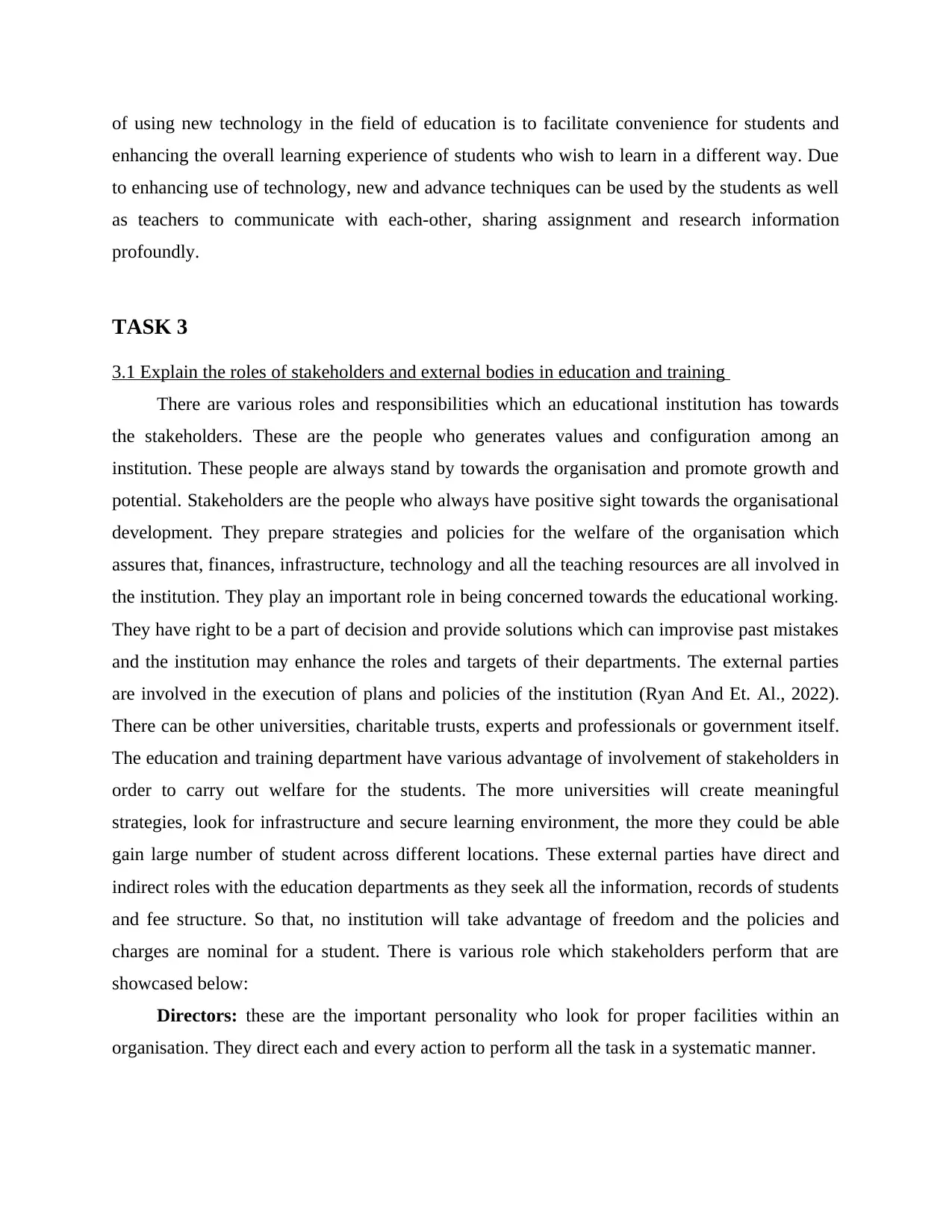
of using new technology in the field of education is to facilitate convenience for students and
enhancing the overall learning experience of students who wish to learn in a different way. Due
to enhancing use of technology, new and advance techniques can be used by the students as well
as teachers to communicate with each-other, sharing assignment and research information
profoundly.
TASK 3
3.1 Explain the roles of stakeholders and external bodies in education and training
There are various roles and responsibilities which an educational institution has towards
the stakeholders. These are the people who generates values and configuration among an
institution. These people are always stand by towards the organisation and promote growth and
potential. Stakeholders are the people who always have positive sight towards the organisational
development. They prepare strategies and policies for the welfare of the organisation which
assures that, finances, infrastructure, technology and all the teaching resources are all involved in
the institution. They play an important role in being concerned towards the educational working.
They have right to be a part of decision and provide solutions which can improvise past mistakes
and the institution may enhance the roles and targets of their departments. The external parties
are involved in the execution of plans and policies of the institution (Ryan And Et. Al., 2022).
There can be other universities, charitable trusts, experts and professionals or government itself.
The education and training department have various advantage of involvement of stakeholders in
order to carry out welfare for the students. The more universities will create meaningful
strategies, look for infrastructure and secure learning environment, the more they could be able
gain large number of student across different locations. These external parties have direct and
indirect roles with the education departments as they seek all the information, records of students
and fee structure. So that, no institution will take advantage of freedom and the policies and
charges are nominal for a student. There is various role which stakeholders perform that are
showcased below:
Directors: these are the important personality who look for proper facilities within an
organisation. They direct each and every action to perform all the task in a systematic manner.
enhancing the overall learning experience of students who wish to learn in a different way. Due
to enhancing use of technology, new and advance techniques can be used by the students as well
as teachers to communicate with each-other, sharing assignment and research information
profoundly.
TASK 3
3.1 Explain the roles of stakeholders and external bodies in education and training
There are various roles and responsibilities which an educational institution has towards
the stakeholders. These are the people who generates values and configuration among an
institution. These people are always stand by towards the organisation and promote growth and
potential. Stakeholders are the people who always have positive sight towards the organisational
development. They prepare strategies and policies for the welfare of the organisation which
assures that, finances, infrastructure, technology and all the teaching resources are all involved in
the institution. They play an important role in being concerned towards the educational working.
They have right to be a part of decision and provide solutions which can improvise past mistakes
and the institution may enhance the roles and targets of their departments. The external parties
are involved in the execution of plans and policies of the institution (Ryan And Et. Al., 2022).
There can be other universities, charitable trusts, experts and professionals or government itself.
The education and training department have various advantage of involvement of stakeholders in
order to carry out welfare for the students. The more universities will create meaningful
strategies, look for infrastructure and secure learning environment, the more they could be able
gain large number of student across different locations. These external parties have direct and
indirect roles with the education departments as they seek all the information, records of students
and fee structure. So that, no institution will take advantage of freedom and the policies and
charges are nominal for a student. There is various role which stakeholders perform that are
showcased below:
Directors: these are the important personality who look for proper facilities within an
organisation. They direct each and every action to perform all the task in a systematic manner.
⊘ This is a preview!⊘
Do you want full access?
Subscribe today to unlock all pages.

Trusted by 1+ million students worldwide
1 out of 24
Related Documents
Your All-in-One AI-Powered Toolkit for Academic Success.
+13062052269
info@desklib.com
Available 24*7 on WhatsApp / Email
![[object Object]](/_next/static/media/star-bottom.7253800d.svg)
Unlock your academic potential
Copyright © 2020–2026 A2Z Services. All Rights Reserved. Developed and managed by ZUCOL.

